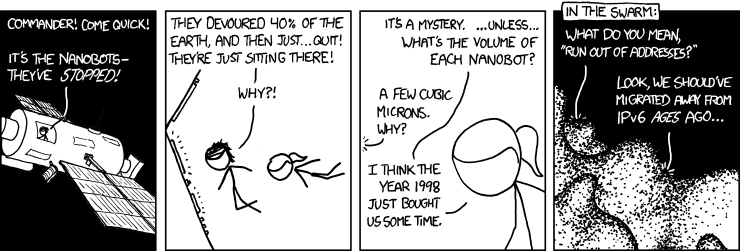so i've googled IPv6, and apparently, there are about 3.4×10^38 IP addresses possible. now, is it me, or is this such a big number that i can't comprehend it?
i've tried to find a comparison for it, but many things i found just fall short or WILDLY overshoot it.
wikipedia states that that's enough addresses to give every human in 2010 5*10^28 ip addresses. that's still too much to comprehend for me.
so i've googled further and i've found that a human body contains 10^14 cells. so IPv6 could give each cell in every human body on the world 2*10^13 possible addresses. that's a step in the right direction, but i can't really get it still.
then i've googled even further, and that's when it starts to overshoot. earth has 3.8*10^50 atoms, but that's way too much.
so can anyone explain me in an understandable way how many IP addresses IPv6 allows for?
and will IPv6 be enough?
-
2011-11-19, 11:21 PM #1Deleted
trying to grasp how many IP addresses IPv6 allows for...
-
2011-11-19, 11:24 PM #2
A Brute force attack against a 256-bit-AES Key requires 2^200 operations .
-
2011-11-19, 11:27 PM #3Deleted
-
2011-11-19, 11:30 PM #4
Well, that's quite a bit less.
Anyways IPv6 Is enough until every planet in the solar system is populated at a density near to what china currently has.
-
2011-11-19, 11:39 PM #5
Well, 10^38 (10 to the 38th power) is a one with 38 zeros behind it. Multiplying by 3.4 would make it 34 with 37 zeroes behind it, or 340,000,000,000,000,000,000,000,000,000,000,000,000, also known as 340 Undecillion (Source).
-
2011-11-19, 11:42 PM #6
I remember reading somewhere that IPv6 will provide 250 IP's for every known star in the universe

-
2011-11-19, 11:43 PM #7Old God


- Join Date
- Aug 2010
- Posts
- 10,508
The number of stars in the Universe is between 10^22 and 10^24.
This is between 34 000 000 000 000 000 and 340 000 000 000 000 IPv6 addresses per star.
-
2011-11-19, 11:48 PM #8Titan


- Join Date
- Apr 2009
- Posts
- 14,326
-
2011-11-20, 01:40 AM #9Field Marshal


- Join Date
- Jul 2009
- Posts
- 50
When thought about purely as "one or more IPv6 per person" its difficult to mentally get a grip on how many people that equals before it's exhausted.
It might be easier to take into consideration how its implemented and deployed:
IPv4 is 4bytes (x.x.x.x), which is a total of 32 bits (00000000.00000000.00000000.00000000). With a few notable exceptions, numbers are partitioned out amongst ISPs, who then subdivide it among their customers (for public IPs at least).
IPv6 is 16bytes read as 8 sets of 4 hexadecimal characters (x:x:x:x:x:x:x:x) for a total of 128 bits (you get the idea). Same as before, the numbers are partitioned, but this time, with the first hexadecimal set for a country/region, then to an ISP, then maybe to another sub-letting ISP, then to the customer. Even by this point, the end customer range is still 64bit, giving the customer-facing ISP an immense amount of addresses to lease.
While not strictly exact, this could be easily seen as being the equivalent of having double the amount of addresses currently used on the IPv4 internet, per customer-facing ISP.
So for example even the poorest, newest startup ISP you've never heard of, could give out double the amount of the addresses that can possibly exist right now on the IPv4 internet.
Also just to screw with your head even more, the final 64 bits of an Ipv6 address contain the MAC address of the receiving device. Given that MAC addresses are meant to be unique (the first half of a MAC address if unique to a manufacturer, so there should not be crossover), this adds to just how unlikely Ipv6 is ever to be used up .
-
2011-11-20, 06:35 AM #10Stood in the Fire


- Join Date
- Apr 2009
- Posts
- 353
Even with IPv4, no network manager would ever use any significant portion of the available addresses. The benifit of having all those addresses comes down to manageability.
Lets say you have 3 buildings with 2 floors each.
Building 1 - 10.1.0.0
Building 2 - 10.2.0.0
Building 3 - 10.3.0.0
Building 1, Floor 1 - 10.1.1.0
Building 1, Floor 2 - 10.1.2.0
Building 2, Floor 1 - 10.2.1.0
Building 2, Floor 2 - 10.2.2.0
Building 3, Floor 1 - 10.3.1.0
Building 3, Floor 2 - 10.3.2.0
Then you have like... 256 different addresses for each floor. Those can be set up like this.
10.1.1.1 - Main switch for that floor.
10.1.1.2 - 10.1.1.10 - Network storage
10.1.1.11 - 100 - Printers, Fire alarms, cameras, etc.
10.1.1.101 - 10.1.1.256 - Computers
Hope that sheds some light. =D
-
2011-11-20, 06:39 AM #11

 Recent Blue Posts
Recent Blue Posts
 Recent Forum Posts
Recent Forum Posts
 The WoW Companion App is Retiring
The WoW Companion App is Retiring MMO-Champion
MMO-Champion

 Reply With Quote
Reply With Quote






